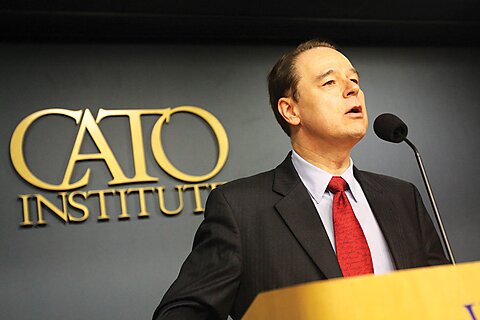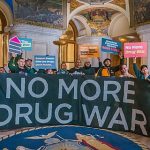
Peter Goettler
Our inestimable colleague, David Boaz, passed away on June 7, after a year‐long battle with cancer. It’s impossible to express how deeply his friends, colleagues, and all libertarians will miss him. David was the longest‐tenured staff member in the history of the Cato Institute, serving the organization and its mission for forty‐three‐and‐a‐half years. He was the executive vice president of the Institute for decades until 2022, when he ascended to the title of distinguished senior fellow of Cato—an honor held by only four others, three of them Nobel laureates in economics.
David made an incalculable contribution to building Cato into the respected institution and voice it is today, as well as to the “mainstreaming” of libertarianism as a legitimate political philosophy worthy of a seat at the table in all of the nation’s policy debates. Few did more than he did to earn it that seat.
David was the first person from Cato whom I ever met. I was a new contributor in 2001 when he visited my office in New York to thank me, to have a conversation, and, of course, to look for more and hopefully larger contributions in the future. He was a dedicated leader of a non‐profit, after all, and that was part of his job.
My experience with David over the ensuing 23 years never deviated from the indelible impression he made on me that very first day. He was smart. He was serious. He dedicated his entire life to protecting and advancing liberty. He loved Cato. And, not least, he was a teacher.
Because I learned from David during that 2001 meeting and would never stop learning from him over the next 23 years. The visit took place about two weeks after the terrorist attack of 9/11. The building was across the street from Ground Zero, and employees were just starting to return. So David visited a near‐empty office and a quiet trading room. We went up to the top‐floor cafeteria to look over the devastation of what used to be the World Trade Center. David remarked, “After this, I’m very concerned about terrorism. But I’m equally concerned about what this will mean for our civil liberties.”
This was a lesson. Because at that time, I only shared David’s first concern—of terrorism. Barely a month later the PATRIOT Act was passed into law, and we would soon see the national security surveillance state mushroom in ways few might have imagined. Later came revelations of extralegal and unconstitutional spying programs. This confirmed that, in the wake of the World Trade Center tragedy, authorities’ respect for civil liberties were at a low ebb and these rights indeed had been degraded. David’s fears back in September 2001 were well‐founded and prescient.
I recall this story because it epitomizes the most important thing I learned from David: all our liberties matter. In defending individual rights we can’t pick and choose, or somehow prioritize the ones that are most important to us. First, because they are interconnected. If we allow some to be threatened or diluted, others will soon be. Second, the ones we deem “less important” may be crucial to us in ways we can’t foresee. And even if not, they are undoubtedly critical to other fellow citizens.
David did much to imbue Cato with a similarly holistic view of individual liberty. He also never ceased to stress the Institute’s need to be truly independent, to be truly nonpartisan, and to adhere faithfully to libertarian principles. It’s now the duty of the Cato staff of today, and of the future, to honor David by upholding all of these values as faithfully and as capably as he did.







